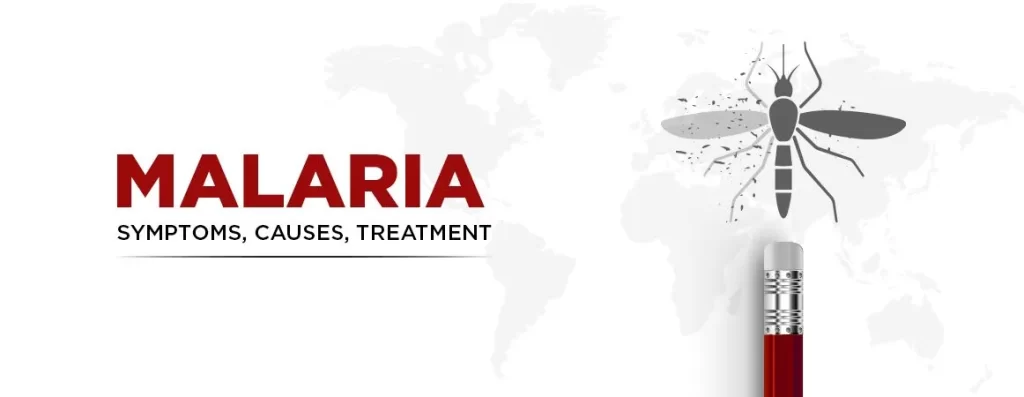Malaria: Causes, Symtpoms, Treatment
Malaria is a life-threatening disease caused by parasites that are transmitted to humans through the bites of infected female Anopheles mosquitoes. It remains a significant health concern in Pakistan, particularly in rural and low-income areas where access to medical facilities may be limited. The disease is both preventable and treatable, yet it affects thousands of people every year, especially during and after the monsoon season.
In this blog, we will explore malaria causes, common malaria symptoms, and effective malaria treatment options to help raise awareness about this serious illness.
Malaria Causes: How Does It Spread?
The primary cause of malaria is the Plasmodium parasite, which is transmitted to humans through the bite of an infected mosquito. Once the parasite enters the bloodstream, it travels to the liver, where it multiplies before infecting red blood cells. There are several species of Plasmodium, but the most common in Pakistan is Plasmodium falciparum, which can lead to severe and life-threatening cases.
Factors Contributing to Malaria in Pakistan:
- Stagnant Water: Puddles, water tanks, and uncovered drains serve as breeding grounds for mosquitoes.
- Climatic Conditions: The warm and humid climate, especially during monsoon season, facilitates mosquito breeding.
- Lack of Preventive Measures: Many areas lack mosquito nets, repellents, and awareness about the disease.
- Limited Access to Healthcare: Delayed diagnosis and treatment often worsen the condition in remote areas.
Malaria Symptoms: How to Identify the Disease?
Early recognition of malaria symptoms is crucial for timely treatment and recovery. Malaria symptoms can vary depending on the type of parasite and the severity of the infection.
Common Malaria Symptoms:
- High Fever: Often accompanied by chills and sweating, fever is one of the earliest and most noticeable symptoms.
- Headache: A persistent headache that doesn’t subside with regular painkillers.
- Muscle and Joint Pain: Generalized body aches and weakness are common.
- Nausea and Vomiting: Some patients experience an upset stomach.
- Fatigue: Extreme tiredness and difficulty carrying out daily activities.
- Jaundice or Yellowing of Skin: In severe cases, the liver is affected, leading to jaundice.
- Convulsions: In children and severe cases, seizures may occur.
It’s important to note that these symptoms can be confused with common viral illnesses, so proper diagnosis is essential.
Malaria Treatment: What Are Your Options?
Once malaria is diagnosed through a blood test, it is crucial to start treatment immediately. Delayed treatment can lead to severe complications, including organ failure and even death.
Common Malaria Treatment Methods:
- Antimalarial Medication: Drugs like chloroquine, artemisinin-based combination therapies (ACTs), and other antimalarial drugs are prescribed depending on the type of malaria.
- Hospitalization: Severe cases often require hospitalization, especially if symptoms like jaundice, convulsions, or severe dehydration are present.
- Supportive Care: This includes managing fever with paracetamol, maintaining hydration, and addressing complications like anemia.
Prevention is Better than Cure
Preventing malaria is easier and more cost-effective than treating it. The following useful advice can help you and your family stay safe:
Preventive Measures:
- Use Mosquito Nets: Sleeping under insecticide-treated mosquito nets can reduce the risk of mosquito bites.
- Apply Mosquito Repellents: Use repellents on exposed skin, especially during peak mosquito activity hours (evening and early morning).
- Get Rid of Breeding Grounds: Make sure your house is free of stagnant water.
- Wear Protective Clothing: Long sleeves and trousers can help reduce skin exposure.
- Spray Insecticides: Regularly spray insecticides in and around your home to kill mosquitoes.
- Seek Medical Advice: If you plan to travel to a malaria-prone area, consult a doctor at MMI (Memon Medical Institute Hospital) for preventive medication.
Conclusion
Malaria is a serious yet preventable disease that continues to affect thousands of lives in Pakistan. Understanding malaria causes, recognizing the symptoms early, and seeking timely treatment can save lives. By adopting preventive measures and spreading awareness, we can work together to reduce the burden of malaria in our communities.
If you or someone you know experiences malaria symptoms, don’t delay visiting a doctor. Early action is key to a full recovery. Together, we can make Pakistan malaria-free!
Post Disclaimer
The information contained in this post is for general information purposes only. The information is provided by "Malaria: Causes, Symtpoms, Treatment "and while we endeavour to keep the information up to date.
Legal Disclaimer
We do not claim to cure any disease which is considered’ incurable ‘ on the basis of scientific facts by modern medicine .The website’s content is not a substitute for direct, personal, professional medical care and diagnosis. None of the medicines mentioned in the posts ,including services mentioned at "medicineguide.us" should be used without clearance from your physician or health care provider.
Testimonials Disclaimer– : Results may vary, and testimonials are not claimed to represent typical results. The testimonials are real, and these patients have been treated with homeopathy treatment from our clinic . However, these results are meant as a showcase of what the best, Medicine can do with their disease contions and should not be taken as average or typical results.


